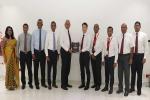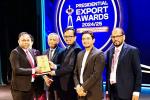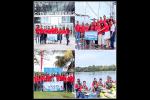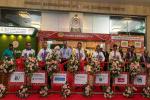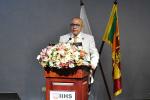At best, non-luxury fashion will grow by just 3 per cent.
As Sri Lanka, a crucial part of the global fashion value chain navigates its way through a crippling macroeconomic crisis, the apparel industry – a mainstay of the economy which showed amazing resilience during and after the pandemic – will have that resilience severely tested. In fact, that has already begun.
This ‘testing’ cannot be overstated: the apparel industry is critical to the sustainability of the nation’s economy.
It is Sri Lanka’s largest foreign exchange earner, accounting for over half of its merchandise exports, and almost half of total exports by value.
It is even more critical to the economy now, as we negotiate a restructuring of external debt and undertake deep economic reforms.
The path ahead is difficult. A series of events – none of which is our making and over which we had no control – has put the nation and the industry in a very vulnerable position.
In 2019, supply chain disruptions sowed the seeds of an inflationary spiral that still persists. In 2020, the pandemic brought the world to a halt.
Even as we were dealing with and recovering from the pandemic's impacts, the war that erupted when Russia invaded Ukraine in February 2022 disrupted global oil markets.
Consequently, this disruption had an impact on international trade.
Furthermore, just as Sri Lanka was in the process of applying for a new round of the GSP+ scheme scheduled for 2024 with the European Union, a political crisis followed by a sovereign debt default plunged the nation into a severe macroeconomic crisis.
The International Monetary Fund (IMF) is providing substantial support, contingent upon the implementation of a rigorous reform program.
As the government prepares to initiate reform implementation, data from the Joint Apparel Association Forum (JAAF) show that apparel exports in the first seven months of the year fell by 23% compared to the same period in 2022.
Persistent inflation in most developed country markets and the failure of policies to bring it down has caused a slowdown in consumer spending, including on apparel.
The slowdown in retail sales cascades down the value chain : slower sales lead to a slowdown in orders, lower output to lower exports from supplier countries like Sri Lanka.
Some of the impacts are already apparent.
There have been media reports about factory closures, but the lack of detail can be misleading.
The apparel industry is basically three-tiered : there are the larger and medium-sized exporting companies in the first tier; a second tier is made up of smaller enterprises that do contract work for firms in the first tier.
A relatively unorganized third tier whose contours the government’s statistical agencies haven’t quite quantified is also present.
This reduction in demand has had a ripple effect, especially in terms of job losses and factory closures, which would primarily affect the Small & Medium Enterprise sector.
Larger apparel and textile manufacturers in Sri Lanka have also had to take action to mitigate the impact of these economic headwinds.
These measures include the consolidation of capacity by merging manufacturing facilities, temporary closure, and in a few cases, the permanent closure of facilities.
While larger players have been able to support their employees through these challenging times, with the sustained impact that is predicted to last through 2024, even large-scale companies are compelled to take these crucial steps to maintain the longevity of their businesses and Sri Lankan apparel at large.
NGOs and activist groups have also expressed fears about mass layoffs.
The macroeconomic crisis and the government’s weak finances underline fears of a social welfare crisis resulting from job losses and salary cuts will sweep the country.
In the apparel sector, those fears are both exaggerated and misplaced.
The decline in orders did lessen total work, but member factories redeployed staff to other facilities when some units shut down in response to that decline in orders.
The industry employs between 300,000 and 350,000 people; that number varies depending on seasonality and attrition.
All members of JAAF, have consistently maintained that worker welfare is our highest priority.
We have proven this, when through the period of the pandemic, the industry vaccinated the entirety of our teams and their families, and through the tripartite agreement made with unions and the Government ensured that employees were paid and remained on the company payroll throughout the lockdown period when they were unable to work.
Investing in health and safety which included families, throughout the economic crisis, our industry provided food and emergency supplies to families.
The current environment, both global and local, calls for realism.
As we work our way through this crisis – experts suggest that much of it is self-inflicted – some factories that have closed may never reopen.
Some attrition will be deep, with some never returning to work.
As the McKinsey report points out, the outlook may be grim.
Roughly 85 per cent of fashion industry executives surveyed for that report felt that the continuing Russia-Ukraine War and high inflation will continue to contribute to the global fragility which will impact the industry.
Several respondents also suggested that retail brands will take a hard look at streamlining operations, paying particular attention to supply chain risks.
This begs the question: How do we respond?
The crisis is an opportunity to take a long-term strategic view for the industry.
This is true for the government, for apparel industry players and buyers.
Changes since the pandemic have been pointing in this direction.
First, change is inevitable, and we should embrace it, not fear it.
Flexible manufacturing and innovation has been the hallmark of Sri Lanka’s fashion industry, especially in high-value apparel.
Companies have innovated with fabric, threads and other material, building special capabilities that meet very specific customer needs. They trust our quality.
Second, the government must partner us in building a strong foundation for the future.
The apparel industry will continue to be the country’s most important foreign exchange earner for some years to come, It is also a critical part of the global apparel supply chain and maintaining that position has several advantages to the economy at large, apart from the trade impact.
Two things will matter: entering into free trade agreements that entrench Sri Lanka in the global value chain.
One particular agreement that is of utmost importance right now is to ensure that we retain our privileges under the new GSP+ regime which has now been extended till December 31st 2027.
The importance of this cannot be overemphasized.
Time is of the essence with the GSP+ and other FTAs including the FTA with India.
Competitor countries like Bangladesh and Vietnam continue to grow through this difficult period through their respective preferential trading agreements and Sri Lanka needs to ensure that we fast track similar initiatives in markets that offer potential for growth of our apparel.
Third, investments in projects like the Eravur Fabric Park, which will increase total value addition in raw material processing must continue, and perhaps accelerate.
A conducive environment that strengthens our global competitiveness needs long-term planning and execution.
Similarly, other crucial inputs into areas like energy must also be easily accessible.
Fourth, in the aftermath of the pandemic, there is growing realization that the buyer-supplier relationship is no longer adequate or even realistic.
A shift is necessary to an importer-partner relationship that captures its true nature.
This will have a bearing on the responsibilities of brands towards workers in the apparel industries in the countries they partner with and be part of our discourse with our partners.
Fifth, it is crucial for the Government and exporters to collaborate on economic reforms that minimize disruptions to the export sector and maintain transparency.
JAAF has consistently advocated for the retention of SVAT, as its elimination would negatively impact cashflows.
Removing SVAT shifts from a cashless voucher system to a cash-based one, increasing cash flow to the Inland Revenue Department, which must then be refunded to exporters.
However, this doesn't translate into revenue enhancement, and it won't impact the Government's ability to meet the IMF's tax-to-GDP ratio target of 14% by 2025.
Additionally, although the law mandates a 45-day refund, historical data shows that exporters often wait well over 12 months, exacerbating cash flow issues in an already weak market environment.
In conclusion, we will leverage the gains we have made in ethical and sustainable apparel manufacturing.
Sri Lanka is already recognized around the world for this facet of its apparel industry.
Sustainability is becoming increasingly important to retail customers and the name ‘Made in Sri Lanka’ will carry significant weight.
This is also a big factor in competitiveness, and we continue to invest more in it.
The road through our crisis is going to be long and arduous, but with perseverance and the Sri Lankan government’s support, we will get through it.
Our resilience will be severely tested, but it will not be broken.
The writer, who has over 20 years of experience is the Secretary General of the Joint Apparel Association Forum - the apex body which guides Sri Lanka apparel towards its ultimate goal of becoming the world’s number one apparel sourcing destination.
He was also a former Chairman of the Sri Lanka Apparel Exporters Association (SLAEA) – one of the constituent organisations of JAAF.
He holds a BSc in Economics from the University College of London and an MBA from the Middlesex University – UK, and has held several key positions including regional roles in multinational apparel operations.
